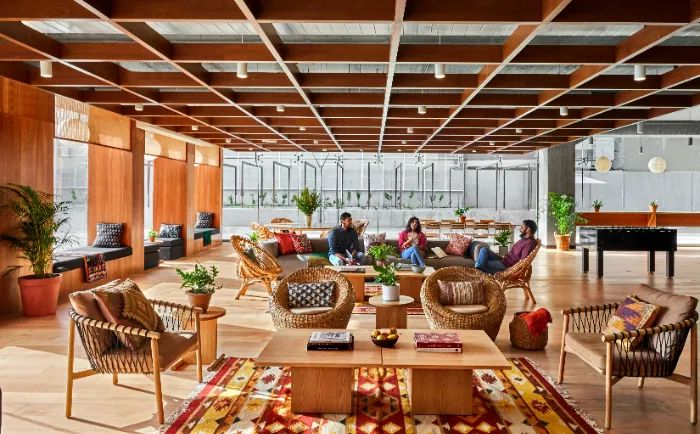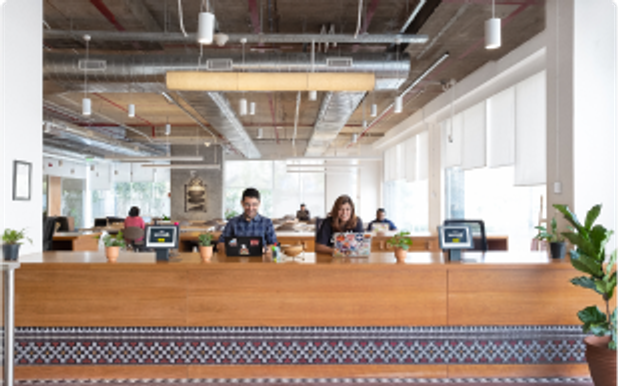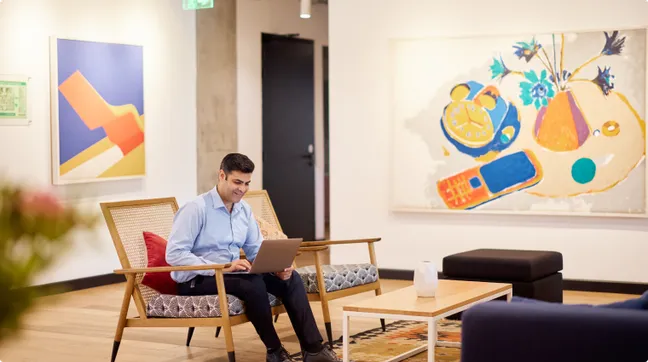WORKSPACE SOLUTIONS
2022: The beginning of a golden era of co-working spaces?

Even though the back-to-back lockdowns caused temporary setbacks to the industry, a majority of coworking spaces are now experiencing a decent resurgence, growth, and increase in demand, thus showcasing the development of this sector.
The COVID-19 pandemic and subsequent lockdowns have emerged as game-changers for the coworking sector.
The pandemic has hit many industries hard in the past two years, but even amid these challenging times, coworking spaces helped employees and employers to stay afloat by adopting hybrid work models. And even though the back-to-back lockdowns caused temporary setbacks to the industry, a majority of coworking spaces are now experiencing a decent resurgence, growth, and increase in demand, thus showcasing the sector's development.
As 2022 begins, coworking spaces have evolved and grown to adapt to the current hybrid working model.
In the last 18 months, the pandemic has not only redesigned the entire coworking ecosystem but has also encouraged real estate developers to join hands with coworking operators to create such special spaces.
According to a Cushman & Wakefield report, coworking operators expanded their portfolio aggressively last year and took on lease 21 per cent more office area - 4.91 million square feet in 2021 from 4.05 million square feet in the previous year - across the top eight cities of Bangalore, Hyderabad, Pune, Mumbai, Delhi-NCR, Chennai, Kolkata, Ahmedabad to meet the rising demand for flexible workspaces from corporates amid the pandemic.
According to another report by JLL, India's coworking space market is likely to cross 50 million square feet by 2023.
Industry experts say that the sector is only poised to grow stronger.
Flexible work model pushes demand
As organisations gradually make the shift back to office work and relook their real estate requirements with an evolving workforce, businesses of all sizes increasingly recognise the merits of the flexible work model. With the emergence of new styles of working and hybrid models, flexible workspaces continue to witness a rise in demand given the agile, cost-efficient, and flexible product solutions they offer as well as other merits such as a sense of community, collaboration and networking with a constant focus on health and safety.
Dharam Mehta, Head - Digital Products, WeWork India, says the coworking firm has seen a consistent rise in large enterprises wanting to shift to its workspaces and sign long-term deals.
“With a presence in prime locations across the country, our innovative product offerings such as On-demand, Virtual Offices, and WeWork Business Solutions are curated to meet the changing demands of members in the new normal that can be customised as per the diverse working requirements. We have seen a 10% rise in our enterprise portfolio and leased more than 1.7 million square feet of office space in the past year,” he says.
Traditionally, flexible/coworking spaces have been popular with start-ups. However, with uncertainty around the spread of the pandemic, larger organisations are also looking at getting out of long-term leases and owned premises.
“Not only start-ups, but even MNCs and established firms are also reorganising their workspaces and are giving preference to shared spaces over others. With new-age workplace options, they are not saving cost but can seamlessly switch between work from home and hybrid model as per their convenience. With this, we are hopeful that coworking space will bring a huge work paradigm shift in 2022 where we will witness more of hybrid-model based sustenance than buying or leasing trends,” says Akshita Gupta, CEO of Delhi-based co-working firm ABL Workspaces.
Sparsh Khandelwal, founder and CEO, Stylework, says the pandemic has accelerated office trends that were expected to take place 8-10 years in the future. “Companies are now adopting business models such as Hub & Spoke, Decentralised and Centralised as a result of which the coworking industry is expected to go up to 15-20 billion dollars by 2022,” he adds.
No more teething problems
Historically, there has been no standardisation in terms of what a coworking space should offer. Fast forward to 2022 and the sector has addressed all the basic needs and got all the teething problems out of the way.
In a market like India, the first few years focused on educating the audience about the benefits, ways to optimise a coworking membership across large companies, plans, and structures. All of these learning experiences have been fast-tracked.
Since India is a highly price-sensitive market, corporates and start-ups now estimate the coworking sector is turning out to be financially the best option for them.
“Organisations and people are beginning to realise that access is more imperative than ownership. This is a secular trend that has been witnessed across the verticals of real estate. Corporates and landlords have had to face the brunt of being on the wrong side of traditional leases which have clearly not worked in their favour. With the lingering uncertainty given the current situation and shift towards the hybrid work approach, people are also realising the benefits of accessing real-estate-as-a-service. Accessing spaces through leases for a limited period of time with restrictions on both the landlord and client is not something we will go back to. It is not flexible for either party and doesn’t capture the uncertainty that the new world brings with it,” says Azaan Feroz Sait, founder and chief happiness officer, The Hub Bangalore.
He says 2022 marks “the beginning of a golden era of shared spaces".
Technology helps manage changing demands in COVID world
The pandemic has transformed the way offices used to function in the past and the coworking sector has always been characterised by its resilience and rapid ability to adapt and respond to new needs, and both users and operators are reconsidering space management to manage the workflow amid rising interest in the segment.
“To meet the new workplaces challenges and safety norms, we focus to make spaces cosier while helping to subtly create distance between people. We are also rethinking about the furniture and other design solutions to create seating arrangements without compromising on the safety and social distancing bit, ensuring people safety,” says Gupta.
“Undoubtedly due to the pandemic, the coworking sector, as many other sectors, has suffered losses by having to limit its operations or close its doors, however many solutions also came up for managing any coworking space effectively such as, cleaning intensification, air regeneration, access control, redistribution of the space, installing disinfectant gel dispensers at common areas and much more,” adds Khandelwal.
Gupta adds that they are also ensuring the use of new-age technology such as sensor-based automatic doors are being used instead of biometric systems, reducing the chances of coming in contact with possibly infected areas.
Innovation is the key
Coworking spaces have realised that even though they are the most flexible option when it comes to office space, they now have a new competitor which is the bedroom!
So how do they compete with a zero-cost office space and 100% flexibility to work from anywhere?
“This worldwide phenomenon has compelled the sector to innovate. Not only work from home, but the sector is also now competing with work from a cafe as well. This is a challenge we have had to address at The Hub Bangalore as well. This is exactly why we have always built The Hub as an open shared community space. We have integrated elements that combine together to create an ecosystem that allows for everything from co-working to relaxing at our rooftop café to attending workshops to pop up retail experiences and even living, all right into the same property,” says Sait.
Offering companies or individuals with benefits such as flexi-plans, micro access passes which can be used over a period of time at locations of their choice, are going to continue witnessing growth.
“This will further yield better returns for the coworking sector, as it helps device better core offerings. Traditional office space concepts and commercial real estate will witness further annihilation due to their rigid and inflexible nature as they no longer fit the bill in the capacity that they used to,” he adds.
Over the next few years, one of the strongest foundational elements of what coworking is all about is likely to come back.
Members of some of the biggest global coworking providers are part of massive worldwide groups – this has been a pretty promising area for the big players. However, Sait says over the next 5 years, with the rise of the Metaverse, smaller players once again have the opportunity to build an open-sourced global community of co-workers- “one that will not be limited by any service provider, borders, but be based solely on shared values.”
“There is an intrinsic desire for all humans to feel connected to others. This is an opportunity waiting to be tapped as we bounce back from lockdowns and get back to work. Coworking may be one sector that may really surprise people with its application in the Metaverse,” he adds.
Related Blogs:

WORKSPACE SOLUTIONS
A workspace is not just about the work. It is also about providing employees a space that allows them the freedom to work where, when, and how they want. Flexibility...

WORKSPACE SOLUTIONS
Businesses should grow smart, not just big. Today, when every business looks forward to expanding its operations or network

